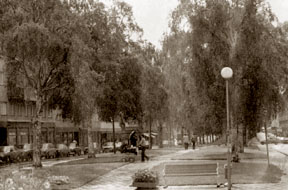
Clean Cities for Habitat Week
'Clean Cities', a special programme organised in connection with
Habitat Week, will be launched in all major cities by the National
Housing Development Authority (NHDA) from September 25 to October 2. The
Week has been declared by the government to formally implement the World
Habitat Day on October 2 on the theme, 'Town - the Attractive Centre of
Aspirations'.
 The 'Clean Cities' programme will be jointly sponsored by the Central
Environment Authority (CEA) and the NHDA; it will be operated under the
Urban Development and Water Supply Ministry in collaboration with Local
Government bodies. The 'Clean Cities' programme will be jointly sponsored by the Central
Environment Authority (CEA) and the NHDA; it will be operated under the
Urban Development and Water Supply Ministry in collaboration with Local
Government bodies.
Some of the activities planned for the Week are new housing projects
to be inaugurated in Colombo, Kandy, Matale, Nuwara Eliya, Kalmunai,
Gampaha and Matara; activating basic development projects under the
existing programmes; and handing over housing projects where the basic
facilities have been completed, to the beneficiaries.
An NHDA spokesman said the construction of at least 500 houses in
urban areas will commence during the week, while over 1,000 dwellers
will also receive the title deeds for housing schemes.
The government expects to obtain the co-operation of these
beneficiaries to develop these housing projects through the Community
Housing Committees that are to be formed.
The programme includes model villages, 'awakened villages' and
pioneer housing projects island-wide, including the North and East,
constructed by the NHDA. Shramadana programmes will be conducted with
the assistance of the householders throughout the country.
The housing schemes in Maligawatta, Gunasinghepura, Manning Town,
Soyzapura and Hantana have been earmarked for the provision of
facilities, during this Week.
A special programme has already been implemented to get the maximum
participation of schoolchildren for the World Habitat Day programme.
More than 1,000 schoolchildren will participate in an environmental
programme implemented by the CEA to commemorate the occasion.
The NHDA has also planned to hold an All Island Art and Essay
Competition under the theme, 'Cities - Magnate of Hope' for
schoolchildren, island-wide.
The National Conference of the World Habitat Day will be held at the
National Youth Services Council Hall, Maharagama on October 2. The first
Monday of October has been designated by the United Nations as World
Habitat Day. The theme for this year is 'Cities - Magnate of Hope.'
Besides the NHDA, the Ministry of Housing and Construction is the main
focal institution of UN Habitat.
The Ministry of Urban Development and Water Supply, Urban Development
Authority, CEA, the Ministry of Local Government and Provincial Councils
and all local authorities will also participate in the Habitat Day
programme.
Face-lift for Educational Publications Dept.
The Educational Publications Department, which prints the school
textbooks that all of you get, is soon expected to be improved to meet
modern day printing requirements.
Accordingly, a policy decision would soon be taken on the printing of
school books. Steps would also be taken to update the Department so that
students will receive their textbooks on time. The Ministry has also
planned to set up a new building complex at the Pattalagedara Vidyapeeta
premises to house the Department's printing section.
This is expected to save the large sum of money that is currently
spent as rental on the premises. The Educational Publications Department
is also planning a face-lift for its bookstall at Olcott Mawatha, which
would make it attractive to the reading public; new reading material
would be provided to the bookstall as well.
These steps are especially intended to help GCE A'Level students.
Literacy, path out of poverty
You may be able to read and understand this news item because you are
literate. But, did you know that over 800 people on Earth cannot read or
write?
 The world has made vast strides in eliminating illiteracy from all
four corners of the globe; adult literacy has improved by 10 per cent
over the last 20 years with the world literacy rate, which stood at 70
per cent in 1980, climbing up to 80 per cent in 2000. While four billion
are already literate, more needs to be done to close this gap. The world has made vast strides in eliminating illiteracy from all
four corners of the globe; adult literacy has improved by 10 per cent
over the last 20 years with the world literacy rate, which stood at 70
per cent in 1980, climbing up to 80 per cent in 2000. While four billion
are already literate, more needs to be done to close this gap.
Illiteracy is a cause of poverty as well. This is emphasised by this
year's theme for the International Literacy Day, which is 'Literacy, the
Path Out of Poverty'. The theme focuses on worldwide literacy issues and
needs. Illiteracy has a gender component too.
Of the 860 million illiterate adult population of the world, two
thirds are women. Over 100 million children also do not have access to
education, and of this, the majority are girls. So, the gender imbalance
of the issue also needs attention. The International Literacy Day was
declared in 1966 by the United Nations Educational, Scientific and
Cultural Organisation (UNESCO).
The idea to celebrate such a day was developed by the World Congress
of Ministers of Education on Eradication of Illiteracy, when they met in
September 1965, in Iran. September 8, the day the Congress convened, was
declared as the Literacy Day.
Many activities are organised by UNESCO and other organisations to
observe this Day; the presentation of five literacy prizes by UNESCO is
one such activity. The UN Literacy Decade - Education for All is also
effective from 2003 to 2012.
The General Assembly welcomed the International Plan of Action for
the Decade and decided UNESCO should spearhead this plan on an
international level. 'Literacy as Freedom' was declared as the theme for
the Decade, which aims to extend the use of literacy to those who
currently don't have access to it.
The reasons to launch the Decade for Literacy are: one fifth of the
world population over the age of 15 are not literate; literacy was
recognised as a human right over 50 years ago in the Universal
Declaration of Human Rights and it is a crime that some people are still
denied this right; a sustained collective effort is needed as the
efforts launched so far in this regard have been unsuccessful. The
objective of the Education for All programme is to increase literacy
rates to 50 per cent by 2015.
The Plan of Action in this regard tackles policy change, flexible
programmes, capacity building, research, community participation,
monitoring and evaluation.
S-SAARC for the second time
S-SAARC, the children's simulated SAARC Summit was held on August 24
and 25 at the Sri Lanka Foundation Institute, and on August 26 at the
BMICH. It was organised by teacher-in-charge of the project, R.L.
Ellawala and students of Ananda College, Colombo.
|

The Summit under way
Pic: Avinash Bandara |
Students from Visakha Vidyalaya, Musaeus College, Ladies College,
Nalanda College, D.S. Senanayake College, Alethea International School
and many other colleges from the Colombo district took part in this
event, where Ryan's International School and Amitti International School
from India also participated.
The summit was held for the second consecutive year, and according to
Ellawala, they hope to organise it every year. Around 200 students
participated this year to represent countries such as India, Pakistan,
Bangladesh, Bhutan, Maldives, Nepal, Afghanistan, China, Japan and Sri
Lanka. The aim of organising this kind of event is to improve the
diplomatic and leadership skills of students.
Children belonging to the age group of 14-18 years participated in
this year's summit; and the organisers hope to open this event to all
schoolchildren in the future, so they can all gain from this experience.
According to Vijaya Lakshmi, the teacher-in-charge of the Indian
students, they'll be participating in the next S-SAARC Summit as well.
We'll bring you more information on the S-SAARC Summit in next week's
Junior Observer.
JA
Snippet: Police test hand-held knife detector
The latest tool in the war against Britain's escalating (increasing)
knife culture is being tested by police forces and prisons, after
proving a huge success with the American military and police.
A palm-held metal detector, which is considered much easier to use
and more sensitive than the traditional wand or airport-style detectors,
is able to pick up knives or blades held in shoes, and is sensitive
enough to detect a pin held in the mouth.
The Eazysearch device also leaves the user's hands free to defend
themselves and can be fitted under a glove for covert (secret) searches.
Twenty-two British police forces are looking at the system, while it
was put into public use for the first time at a leisure centre in Aston,
Birmingham.
The Daily Telegraph
Kataragama Museum to get due recognition
The Kataragama Archaeological Museum, though not very well known
among the public, holds an important place as an informal education
centre, and as a cultural centre depicting a glimpse of the history of
the Kataragama Devalaya as well as other ancient places in the southern
area and the Ruhuna Kingdom. Despite this value, it had been neglected
over a long period of time by the relevant authorities, without getting
its due recognition.
This however, will change soon. Now, there are plans to convert this
museum into an international information centre. The Sri
Lanka-Netherlands Cultural Co-operation Programme is expected to provide
a sum of Rs. 6.6 million for this project.
The plan includes the construction of a mini theatre and a library
catering to the needs of the public, especially foreigners.
A ceremony was held at Kataragama recently to begin the initial work
of this project.
|




 The 'Clean Cities' programme will be jointly sponsored by the Central
Environment Authority (CEA) and the NHDA; it will be operated under the
Urban Development and Water Supply Ministry in collaboration with Local
Government bodies.
The 'Clean Cities' programme will be jointly sponsored by the Central
Environment Authority (CEA) and the NHDA; it will be operated under the
Urban Development and Water Supply Ministry in collaboration with Local
Government bodies.  The world has made vast strides in eliminating illiteracy from all
four corners of the globe; adult literacy has improved by 10 per cent
over the last 20 years with the world literacy rate, which stood at 70
per cent in 1980, climbing up to 80 per cent in 2000. While four billion
are already literate, more needs to be done to close this gap.
The world has made vast strides in eliminating illiteracy from all
four corners of the globe; adult literacy has improved by 10 per cent
over the last 20 years with the world literacy rate, which stood at 70
per cent in 1980, climbing up to 80 per cent in 2000. While four billion
are already literate, more needs to be done to close this gap. 








